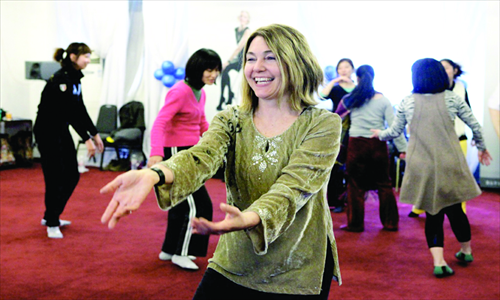Dance your addiction away

For genuine sufferers of Internet addiction, being weaned off the web will take more than the usual song and dance to get results.
In fact, it takes a professional song and dance. Dance therapy is a form of psychotherapeutic treatment which has been used to treat Internet addiction by enhancing the sufferer's awareness of the body and emotion.
Dance therapy uses natural responses to rhythm to release pent up emotion and energy that lie at the heart of compulsive disorders.
Hunched and contorted postures can hint at introversion. A trained therapist can coax more positive expressions of self-esteem through open and flamboyant shapes: the patient's arms extended, head back and hips moving with the rhythm.
Zhang Yi, 43, is a dance movement therapist at Inspirees, an international training institute for dance therapists in Chaoyang district.
Zhang explained that dance therapy "works on the patient's inner-self rather than projecting external form," a technique which she says encourages self-esteem and gives people the confidence to cut out repetitious, antisocial behavior.
Zhang said she recently helped a 17-year-old student named Xiao Wen who was heavily addicted to the Internet.
"He said he felt like a real man when playing Internet games, killing bad people by playing the role of the hero," she said.
Xiao started learning from Zhang at the recommendation of family friend Song, a 48-year-old business manager and Beijinger.
Song said that Xiao's Internet addiction began to develop after Xiao failed to pass several exams and his confidence took a steep dive.
"He fell into playing video games and spent most of his evenings in Internet bars," Song said. "His grades got worse, which is when parents realized they needed to intervene."
Song said Xiao was initially reluctant to embrace dance therapy.
"He was resentful and rebellious. He did not want to cooperate and refused to talk to his parents," Song said.
But the change within him from dance therapy was easy to see, even after the first session.
"He was calm, and had stopped snapping at his parents and cursing," he said.
Uliana Dzyuba, 28, another dance therapist at Inspirees and originally from Russia, said dancing therapy involves "the kind of repetitious movements you find yourself making when you listen to your favorite music at home while washing the dishes."
Dzyuba says the first session focuses on breathing and slow movements unaccompanied by music.
Then after the dancing session, students answer questions about their own feelings and form their bodies into "feeling sculptures."
Song said undergoing dance therapy with Zhang has transformed Xiao into a more diligent student and social individual, though it has not managed to entirely stop his Internet dependency or gaming habit.
"Xiao is now busy studying and hasn't needed therapy for a while," Song said. "He still loves those video games, just not as compulsively as before."
The hope that more troubled teenagers like Xiao may benefit from movement therapy is strong among those like Song who have seen its positive effects.
However, dancing may only be a cathartic distraction rather than a resolute cure for teens hooked on Internet use.
"Xiao hasn't danced since the end of the therapy," Song said. "He's really not much of a dancer."